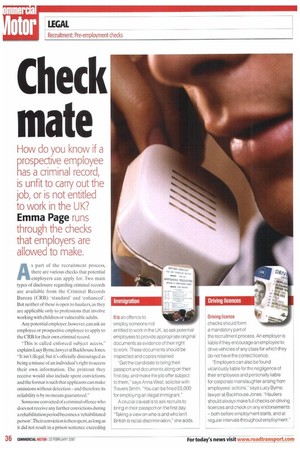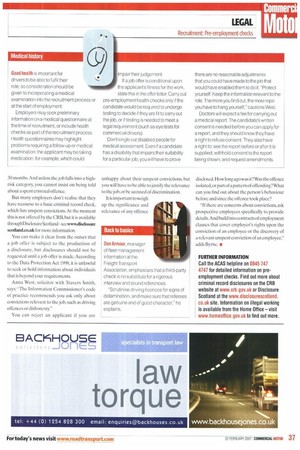Check mate
Page 36

Page 37

If you've noticed an error in this article please click here to report it so we can fix it.
How do you know if a prospective employee has a criminal record,
-s unfit to carry out the
job, or is not entitled to work in the UK?
Emma Page runs through the checks that employers are allowed to make.
As part of the recruitment process, there are various checks that potential employers can apply for. Two main types of disclosure regarding criminal records are available from the Criminal Records Bureau (CRB): 'standard' and 'enhanced'. But neither of these is open to hauliers, as they are applicable only to professions that involve working with children or vulnerable adults.
Any potential employer,however, can ask an employee or prospective employee to apply to the CRB for their own criminal record.
"This is called enforced subject access," explains Lucy Byrne,lavvyer at Backhouse Jones "It isn't illegal, but it's officially discouraged as being a misuse of an individual's right to access their own information. The printout they receive would also include spent convictions, and the format is such that applicants can make omissions without detection — and therefore its reliability is by no means guaranteed."
Someone convicted of a criminal offence who does not receive any further convictions during a rehabilitation period becomes a 'rehabilitated person'.Their conviction is then spent, as long as it did not result in a prison sentence exceeding
Immigration
It is an offence to employ someone not entitled to work in the UK, so ask potential employees to provide appropriate original documents as evidence of their right to work. These documents should be inspected and copies retained.
"Get the candidate to bring their passport and documents along on their first day, and make the job offer subject to them," says Anna West, solic'itor with Travers Smith. You can be fined 25,000 for employing an illegal immigrant."
A crucial caveat is to ask recruits to bring in their passport on the first day. "Taking a view on who is and who isn't British is racial discrimination," she adds.
Driving licences
Driving licence checks should form a mandatory part of the recruitment process. An employer is liable if they encourage an employee to drive vehicles of any class for which they do not have the correct licence.
'Employers can also be found vicariously liable for the negligence of their employees and personally liable for corporate manslaughter arising from employees' actions," says Lucy Byrne, lawyer at Backhouse Jones. "Hauliers should always make full checks on driving licences and check on any endorsements — both before employment starts, and at regular intervals throughout employment." Good health is important for drivers to be able to fulfil their role, so consideration should be given to incorporating a medical examination into the recruitment process or at the start of employment.
Employers may seek preliminary information on a medical questionnaire at the time of recruitment, or include health checks as part of the recruitment process. Health questionnaires may highlight problems requiring a follow-up or medical examination: the applicant may be taking medication, for example, which could 30 months. And unless the job falls into a highrisk category, you cannot insist on being told about a spent criminal offence.
But ninny employers don't realise that they have recourse to a basic criminal record check, which lists unspent convictions. At the moment this is not offered by the CRB, but it is available through Disclosure Scotland—see www.disdosure scotland.co.uk for more information. Back to basics You can make it clear from the outset that a job offer is subject to the production of a disclosure, but disclosures should not be requested until a job offer is made. According to the Data Protection Act 1998, it is unlawful to seek or hold information about individuals that is beyond your requirements.
Anna West, solicitor with Travers Smith, says: "The Information Commissioner's code of practice recommends you ask only about convictions relevant to the job, such as driving offences or dishonesty."
You can rejeci an applicant if you are impair their judgement.
If a job offer is conditional upon the applicant's fitness for the work, state this in the offer letter. Carry out pre-employment health checks only if the candidate would be required to undergo testing to decide if they are fit to carry out the job, or if testing is needed to meet a legal requirement (such as eye tests for commercial drivers).
Don't single out disabled people for medical assessment. Even if a candidate has a disability that impairs their suitability for a particular job, you will have to prove unhappy about their unspent convictions, but you will have to be able to justify the relevance to the job, or be accused of discrimination.
It is important to weigh up the significance and relevance of any offence Don Armour, manager of fleet management information at the Freight Transport Association, emphasises that a third-party check is no substitute for a rigorous interview and sound references.
"Scrutinise driving licences for signs of delamination, and make sure that referees are genuine and of good character," he explains. there are no reasonable adjustments that you could have made to the job that would have enabled them to do it. "Protect yourself. Keep the information relevant to the role. The more you find out, the more rope you have to hang yourself," cautions West.
Doctors will expect a fee for carrying out a medical report. The candidate's written consent is needed before you can apply for a report, and they should know they have a right to refuse consent. They also have a right to: see the report before or after it is supplied; withhold consent to the report being shown; and request amendments.
disclosed. How long ago was it? Was the offence isolated,or part of a pattern of offending? What can you find out about the person's behaviour before and since the offence took place?
"If there are concerns about convictions, ask prospective employees specifically to provide details. And build into contracts of employment clauses that cover employer's rights upon the conviction of an employee or the discovery of a relevant unspent conviction of an employee," adds Byrne. •
























































































































































































